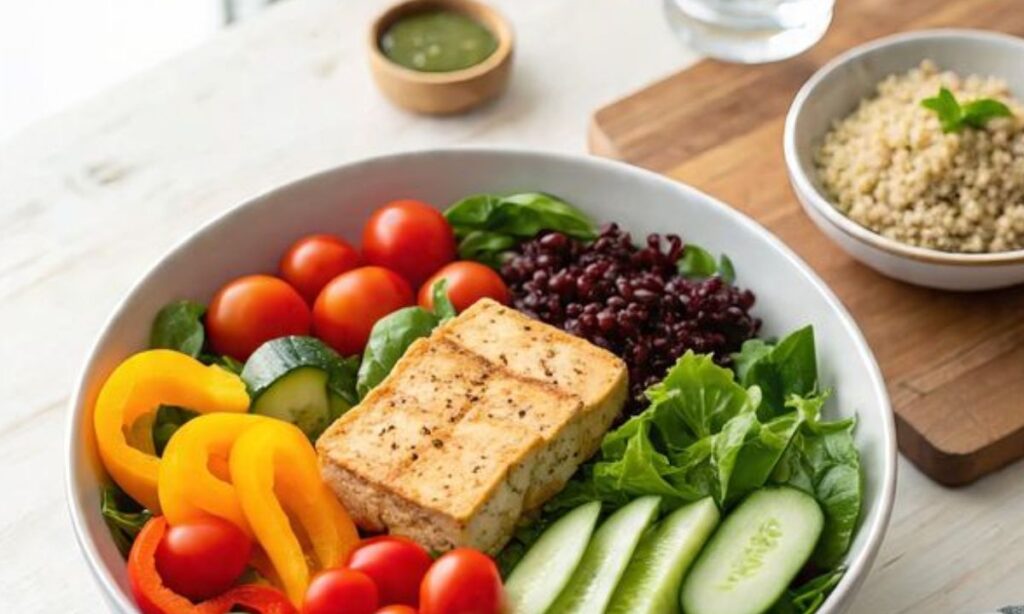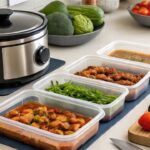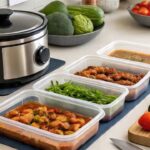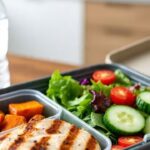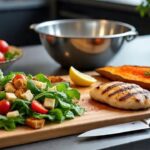Intermittent fasting (IF) has become one of the most popular approaches to healthy eating and weight management. By timing your meals strategically, you can enhance fat loss, improve energy levels, and simplify your eating habits. However, proper meal prep is the secret to succeeding with intermittent fasting. This guide covers everything you need to know about preparing meals for your fasting schedule.
What Is Intermittent Fasting?
Intermittent fasting is an eating pattern where you alternate between periods of fasting and eating. Common approaches include:
- 16/8 method: Fast for 16 hours and eat within an 8-hour window.
- 5:2 method: Eat normally for 5 days and consume low-calorie meals (500–600 calories) for 2 days.
- Alternate-day fasting: Fast every other day while eating normally on non-fasting days.
Benefits of Meal Prepping for Intermittent Fasting
- Consistency: Ensures you stay within your eating window.
- Portion control: Helps prevent overeating when the eating window begins.
- Time-saving: Minimizes cooking during busy weekdays.
- Improved nutrition: Encourages balanced meals with all essential nutrients.
Key Principles of Intermittent Fasting Meal Prep
- Plan your eating window: Decide in advance when you’ll eat and fast.
- Choose nutrient-dense foods: Focus on lean proteins, healthy fats, and complex carbs.
- Stay hydrated: Water, herbal teas, and black coffee help during fasting periods.
- Prepare balanced meals: Include vegetables, whole grains, and protein-rich foods.
Sample Intermittent Fasting Meal Prep Table
| Meal Type | Example Foods | Notes for Prep |
|---|---|---|
| Breakfast (Breaking Fast) | Greek yogurt with berries, chia seeds, and almonds | High-protein and fiber to stabilize energy |
| Lunch | Grilled chicken, quinoa, and roasted vegetables | Make in bulk and portion into containers |
| Snack (Optional) | Hummus with sliced cucumber and carrots | Great for quick energy during the window |
| Dinner | Salmon with brown rice and steamed broccoli | Pre-marinate protein to save time |
Steps to Prep Meals for Intermittent Fasting
- Plan your menu for the week.
- Batch cook proteins like chicken, fish, or tofu.
- Pre-cut vegetables for quick salads or stir-fries.
- Store meals in portion-controlled containers.
- Label containers with the day and time to eat.
- Keep healthy snacks ready for your eating window to avoid junk food.
Foods to Include in Intermittent Fasting Meal Prep
- Proteins: Chicken, turkey, salmon, tuna, tofu, eggs
- Healthy Fats: Avocado, olive oil, nuts, seeds
- Complex Carbs: Quinoa, brown rice, oats, sweet potatoes
- Fiber-Rich Veggies: Broccoli, spinach, kale, carrots
- Hydration Options: Water, green tea, herbal teas
Foods to Avoid
- Highly processed foods
- Sugary snacks and drinks
- Deep-fried fast foods
- Excess refined carbs (white bread, pasta)
Tips for Successful Intermittent Fasting Meal Prep
- Stick to simple recipes: Less stress and faster cooking.
- Use high-quality containers: Keeps food fresh longer.
- Include a variety of flavors: Prevents meal boredom.
- Don’t skip hydration: Dehydration can mimic hunger.
- Track your macros: Ensure you’re meeting your calorie and nutrient needs.
Frequently Asked Questions (FAQs)
Q1: How many meals should I prepare for my eating window?
A: It depends on your chosen IF method. Most people prepare 2 main meals and an optional snack.
Q2: Can I drink coffee or tea during fasting?
A: Yes, unsweetened black coffee, plain tea, and water are allowed during fasting hours.
Q3: How long can meal-prepped food last?
A: Most cooked meals last 3–4 days in the refrigerator. Freeze extras for longer storage.
Q4: Should I count calories during intermittent fasting?
A: While not mandatory, tracking calories can help with weight goals and portion control.
Q5: What if I feel hungry during fasting?
A: Stay hydrated with water or herbal tea. Over time, your body adjusts to fasting.
Quick Meal Prep Ideas
- Overnight oats with chia seeds for breaking the fast.
- Baked salmon with roasted veggies for a nutrient-packed dinner.
- Smoothie packs (pre-cut fruits and greens) for a quick blend.
- Protein bowls with quinoa, beans, and grilled chicken or tofu.
Final Thoughts
Intermittent fasting can be a powerful lifestyle choice, but success depends on preparation. By planning and prepping meals ahead of time, you’ll avoid stress, maintain energy, and stay on track with your health goals. Stick to whole foods, balance your nutrients, and hydrate well for the best results.
